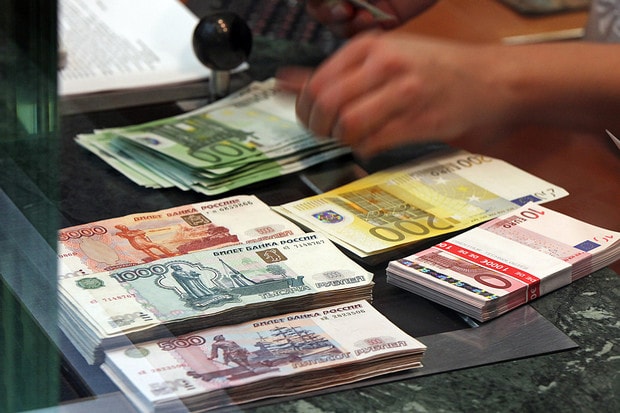"Dark shadow" of financial crisis in Russia
(Baonghean) - The Russian ruble has fallen to a record low in recent days, with 80 rubles to 1 USD and 100 rubles to 1 Euro. Despite the fact that the Russian Central Bank had to sharply increase interest rates from 10.5% to 17%, the ruble's fastest and strongest decline in 16 years, along with record lows in oil prices, is reminiscent of the 1998 financial crisis. At that time, the ruble collapsed and Russia defaulted. Will this scenario repeat itself?
 |
| The Russian ruble continues to depreciate. Source: Bloomberg |
| RELATED NEWS |
|---|
Back in 1998, the collapse of the monetary system in just a few days caused Russia to default on its debt and officially fall into a currency crisis. And not only Russia, this was also a crisis for the entire emerging market bloc with oil prices and currencies plummeting simultaneously. Returning to the present time, many similar factors have appeared, when the Russian ruble could not stop the decline and the storm of falling crude oil prices in the US and world markets continued to rage. December 15 was not only the bottom of the ruble value, but also the "worst" day for crude oil in the past 7 years. Specifically, since the peak price of 107 USD/barrel for WTI crude oil and 115 USD/barrel for Brent crude oil in June, the prices of these two types of oil have decreased by more than 50% so far.
Meanwhile, according to Bloomberg, the exchange rates of the 20 most traded currencies of the emerging market bloc fell to their lowest level in the past 11 years on December 15. Besides the ruble, the Indonesian rupiah recently fell to its lowest level since 1998, and the Turkish lira could not avoid devaluation. Another factor that makes the public think of the 1998 financial crisis is that the US Federal Reserve is planning to raise interest rates for the first time since 2006, increasing the possibility of massive capital withdrawal from developing countries. Returning to the Russian economy, another disadvantage is that US President Barack Obama has just announced that he will sign a bill to continue sanctions against Russia this week. If this happens, it is unknown what will happen next to the current Russian economy.
However, according to analysts, the situation is not as dire as in 1998 when the current context has changed a lot. According to analysts, currently developing countries, including Russia, have allowed their currencies to fluctuate freely instead of following the rigid fixed exchange rate mechanism as in 1998. In addition, these countries also have foreign exchange reserves that are much higher than 16 years ago, which is a condition to be able to overcome unexpected fluctuations in the financial market. Another factor is that instead of the US dollar, developed countries today mostly mobilize capital in local currency, allowing them to repay debts without worrying about depleting their foreign exchange reserves. Meanwhile, although the Russian economy is in decline, Russian officials still appear undaunted and call on people to trust in the local currency. In a recent statement, Minister of Economy Alexei Ulyukayev said that the current exchange rate does not match Russia's basic macroeconomic situation, and the ruble's depreciation is simply a matter of market calculation and expectation.
In terms of causes, the ruble's devaluation is due to sanctions from the US and the European Union. However, the EU is currently divided in sanctions against Russia, because once the Russian economy is damaged, the economies of EU countries will also be severely affected. Therefore, "blocking all roads" of Russia is not the optimal solution for the EU. Meanwhile, the recent statement of the US President about signing the bill to continue sanctions against Russia is also considered a "confusing message" sent to European allies, when there was no consultation with the EU on this issue. Thus, there are many reasons to show that a financial crisis scenario will be difficult to repeat for Russia in particular and emerging economies in general. Although Russia's currency reserves and public financial system are now much more stable than in 1998, Russia is actually facing too many difficulties. Therefore, Russia urgently needs a solid economic stability policy that does not allow for errors and mistakes.
Phuong Hoa






